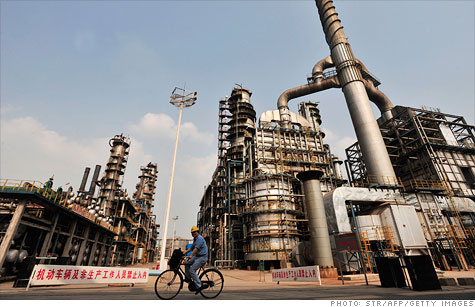
A worker rides a bicycle at a Sinopec oil refinery in China. State-owned enterprises, like Sinopec, account for roughly 40% of the country's GDP, according to estimates.
NEW YORK (CNNMoney) -- The World Bank and a Chinese think tank have a stern warning for China's government: transition to a freer market system, or else face an economic crisis.
The "China 2030" report, released by the World Bank on Monday, recommends China enact reforms promoting a freer economy. Those reforms include a major overhaul turning China's powerful state-owned companies into commercial enterprises.
"China could postpone reforms and risk the possibility of an economic crisis in the future -- or it could implement reforms proactively. Clearly, the latter approach is preferable," the report said.
The report is compiled by the World Bank and the Development Research Center, a research group that reports directly to China's State Council. It encourages China to promote innovation, competition and entrepreneurship as means of economic growth, rather than allowing growth to be primarily government engineered.
The world's second-largest economy has been rising rapidly, averaging around 10% growth a year for the last three decades. Much of that momentum has come as China's rural population moves into the cities and as the government has funded massive infrastructure projects and retained a powerful influence over the country's biggest companies.
State-owned companies dominate China's banking, energy, telecom, health care and technology sectors. Overall, they account for about 40% of the country's gross domestic product, according to Andrew Szamosszegi and Cole Kyle, who have researched the topic for the U.S.-China Economic and Security Review Commission.
Their latest report to the commission puts it bluntly: The Chinese government has not "expressed an interest in becoming a bastion of free market capitalism."
Critics point out that China cannot maintain rapid growth under this system forever. Emerging economies tend to start slowing when their GDP reaches about $16,740 per capita, according to research by economists Barry Eichengreen of the University of California at Berkeley, Donghyun Park of the Asian Development Bank and Kwanho Shin of Korea University.
They suspect China will hit the slowdown point around 2015. The World Bank's report forecasts a similiar slowdown, predicting economic growth will gradually slow from an average of 8.6% in 2011-2015 to an average of 5% growth per year in 2026-2030.
"China's leaders have recognized that the country's growth model, which has been so successful for the past 30 years, will need to be changed to accommodate new challenges," World Bank Group President Robert Zoellick said in a statement.
The World Bank's report suggested China should separate "ownership from management" of state-owned enterprises and implement modern corporate governance practices, including appointment of senior management, public financial disclosures and external auditing.
In spinning off its state-owned companies, the report recommended the government should also consider establishing state asset management companies that would represent the government as a shareholder, but would "independently and professionally" manage and trade assets in financial markets.
China currently has four major asset management companies that it originally created to oversee bad loans spun off from its four major banks. They're 100% owned by the Chinese government. ![]()
| Overnight Avg Rate | Latest | Change | Last Week |
|---|---|---|---|
| 30 yr fixed | 3.80% | 3.88% | |
| 15 yr fixed | 3.20% | 3.23% | |
| 5/1 ARM | 3.84% | 3.88% | |
| 30 yr refi | 3.82% | 3.93% | |
| 15 yr refi | 3.20% | 3.23% |
Today's featured rates:
| Latest Report | Next Update |
|---|---|
| Home prices | Aug 28 |
| Consumer confidence | Aug 28 |
| GDP | Aug 29 |
| Manufacturing (ISM) | Sept 4 |
| Jobs | Sept 7 |
| Inflation (CPI) | Sept 14 |
| Retail sales | Sept 14 |